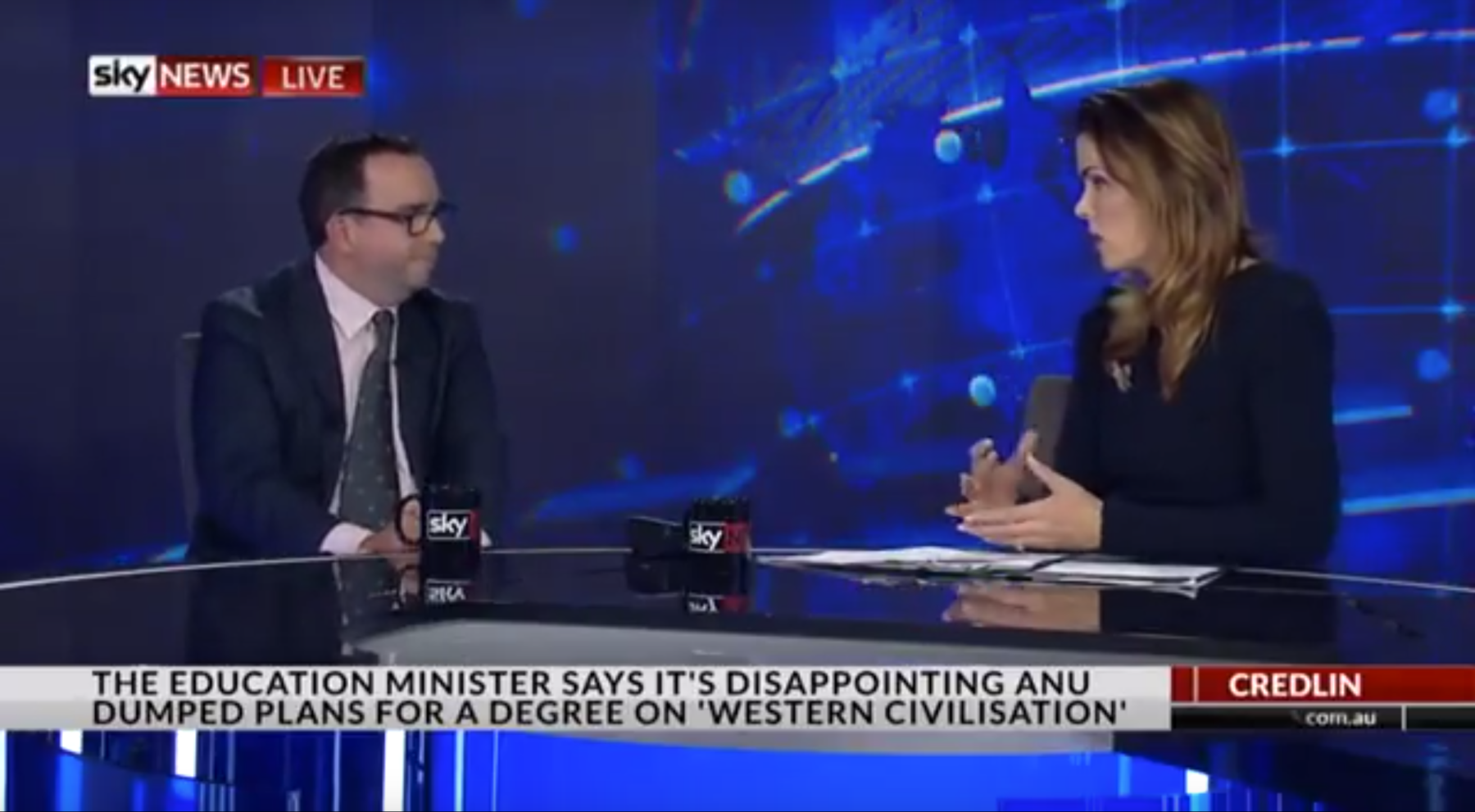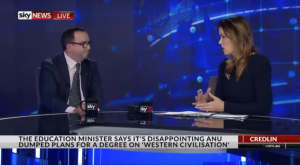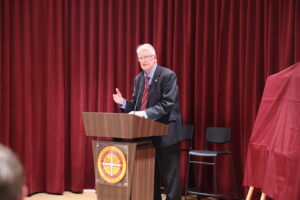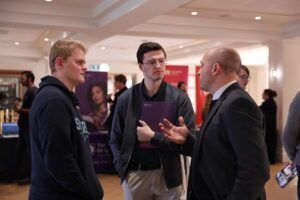Sky News interviews Campion president Dr Paul Morrissey


On 5 June 2018, Dr Paul Morrissey was invited to Sky News for an interview with Peta Credlin to discuss the opposition of some Australian universities and students to the study of Western Civilisation and how Campion College is acting as a corrective to such an attitude.
------------------
TRANSCRIPT
Peta Credlin: Well this week we've seen the Australian National University pull out of negotiations to host a degree in Western Civilisation studies sponsored, at no cost to the ANU, by the Ramsay Centre. Paul Ramsay was a great Australian who left his $3.3 billion fortune to a range of charitable causes, but one very close to his heart was to establish university scholarships so that young Australians could learn more about what has made Western democracies, like Australia and others, great and why values matter. But in a shock move over the weekend, following pressure from activists and the unions, the ANU said no to this generous funding. So it's back to the drawing board for the Ramsay Centre, chaired by former Prime Minister John Howard. To call this disappointing is an understatement. Joining me tonight to discuss the reluctance of our education system to accept the study of Western Civilisations and what this could mean for Australia is the president of Campion College, Dr Paul Morrissey. Thanks for your time, Dr Morrissey.
Dr Morrissey: Thank you, Peta. It's great to be on your show.
Peta Credlin: Well I'm delighted to have you here. You head up Campion College, it's a Liberal Arts college. Now, if anyone's been educated in the United States they'll know what we mean by the term 'Liberal Arts college' but it's a little bit new in Australia; you're the first and only Liberal Arts college, explain to us what it is and what's important about Liberal Arts.
Dr Morrissey: You're right, Peta. They are very common in the United States but in Australia, as you said, Campion is the first Liberal Arts college, the only higher education institute dedicated to the Liberal Arts. Liberal Arts have a great tradition in the history of Western civilisation, starting way, way back before the Middle Ages, but they took on in the Middle Ages itself a more humanistic approach, so it's really the study of the humanities. The study of literature, history, philosophy, the study of beliefs - Jewish, Christian and so on - and how they have shaped Western civilisation. So it's a broad-based degree rather than a narrow, vocational degree. So the Liberal Arts is about that but it's also about the word 'liberal', liberal in the sense of being about freedom. So a Liberal Arts education is firstly about liberating a student from ignorance, the ignorance really of their past, and all the ideas, institutions and so on that have forged the past. So it's liberation from that, but it's liberation for something. It's not just a liberation from, but a liberation for what is good, what is true, what is noble, and to pursue those things in a contemporary world which is often complex and difficult to navigate at times.
Peta Credlin: When there was this debate at this stage last week that the ANU had not made a decision to reject the Ramsay Centre funding, it was in negotiations, and they've been going on for some time; it seems that once the activists got to public attention towards the end, that's when I think things were pulled by the chancellor of the ANU. You were in The Australian newspaper and you were saying it's so important that we study Western civilisation, the Western canon if I can call it that, and that universities are supposed to be places for this sort of debate. You made the important, powerful point that just because you study Western civilisation it doesn't mean that you don't also learn about its failures or its failings or where it hasn't lived up to its promise. That's a fair point, isn't it?
Dr Morrissey: Absolutely. I think this is one of the difficulties at moment in Australian universities, particularly in the humanities departments, where there's a lot of critiquing happening, critiquing of the Western tradition and so on through the lens of identity politics and so on. But really, you can't critique something if you don't know it.
Peta Credlin: Absolutely, absolutely.
Dr Morrissey: You cannot look at something, at its flaws as well as what's positive about it without actually knowing something about it, so I think that's a huge failing, not just really of humanities departments in universities but also in our education system. I just don't think our students know enough about their past in order to, one, celebrate what it's achieved but, two, to be able to critique it properly.
Peta Credlin: It's interesting, when I studied law I went back and did feminist legal theory and a lot of feminist subjects because there was a whole debate about feminist culture in the 80s and 90s and I was ill-informed to enter that debate. Now I don't agree with a lot of it but you can't critique something if you don't understand its underpinnings and its scholarship and its argument, I 100 per cent agree with that. When the decision was made over the weekend by the ANU to pull out of this negotiation and reject this money, there's now a debate about whether any other of the sandstone eight will take on this bequest and take these students. What do you think the chances are that it'll get up?
Dr Morrissey: I don't want to comment too much on the Ramsay Centre and what it's trying to achieve other than..
Peta Credlin: Are we going to see the sandstone eight take on Western civilisation in the same way that, say, Campion has done?
Dr Morrissey: Yeah I think certainly, as I said before, a lot of the humanities departments in these institutions, as was shown in the IPA report last year, which made an extensive study of the history curriculums of every university in Australia, that there's very little attention paid, even in history, to actual Western civilisation, which to me is quite astonishing. And just by that very fact, a degree or a program that Ramsay's proposing is at odds with what's happening in some of these universities and therefore is controversial, even though it shouldn't be.
Peta Credlin: Well it shouldn't be.
Dr Morrissey: It shouldn't be controversial at all.
Peta Credlin: A media report yesterday confirmed that the ANU has accepted up to $2 million from the governments - not think tanks, from governments - the governments of the UAE, Iran and Turkey, it established in 1994 for the ANU Centre for Arab and Islamic studies, yet they won't accept scholarships or scholarships for students to study Western civilisation. Arab studies fine, Western civilisation not so fine. The issue's a real consistency one, isn't it?
Dr Morrissey: Absolutely, and it goes back to that basic point, that if we don't actually study our own civilisation then how can we actually look at other civilisations, see what's good about them, or critique them or critique ourselves. We really need to understand where we've come from first and even just a fair playing field; it seems to be a bit strange that you can fund, independently or from another government, a particular program of another civilisation or another area but not one that looks at actual Western civilisation.
Peta Credlin: We're about the same age, I reckon; what's happened to universities since our time going through, when you were invited to debate, when you wanted to have an intellectual contest, when you weren't afraid of a different view - what's happened to universities in the last 20 or so years where the alternative view, how difficult it might be to hear, is shut down, it's not put on the table and debated, it's obliterated or removed or taken out of the books even?
Dr Morrissey: It is quite astonishing. I did a Bachelor of Arts degree not that long ago, but probably a similar time to when you were a student, and you're right, there was - even though it was, broadly speaking, fairly left and...
Peta Credlin: It was left, but it wasn't a hindrance
Dr Morrissey: And this is why I don't think this is a thing about partisan politics, it's really about a liberal education, which is everyone's right and which everyone should have. And what's happening at the moment, at least in a lot of the humanities departments is that, as you say, debate is not allowed; that there's a certain view that is allowed and there's a debate that's not allowed. There's a fantastic scholar in the States who's set up a website, it's basically a web community, called the Heterodox Academy, which is aware of this. And these are, again, for want of a better term, left-leaning academics, but they're aware of what's happening, and they're saying there's actually no competition for ideas in a lot of universities, so they've set up this website, this group called the Heterodox Academy, to go against the orthodoxy which doesn't allow debate, which is stifled by identity politics and so on. So I'd really recommend people to have a look at that and see what they're doing because they're really aware of it, and it goes to the point that it's not about politics, it's not about this idea that Western civilisation's conservative is identity politics is of the left - a liberal education is about liberating the mind and that's what it's about.
Peta Credlin: So how is it that we can, right now in an Australian university, basically celebrate and study every identity but our own? That we've become so politically correct that we're scared to even look into Australian history; I mean I remark often that we don't even study historical figures much any more or chronological history; there's a whole debate about the whiteness of our curriculum - have we, I think we have but, arguably, we've swung things so hard back the other way that we've lost a lot of our intellectual rigour.
Dr Morrissey: Absolutely and I think history is a particular example because I know my children, that when they look at history in the national curriculum and so on, I'll ask them what they're studying in, say, history and they'll come back and say they're studying sustainability and they're looking at history through that lens.
Peta Credlin: That's one of the critical building blocks that's got to be in every subject
Dr Morrissey: Every single subject and I just find that not a liberal education. They need to know where they've come from, they need to know the great figures of the past, they need to know where the institutions which our freedoms are built on, where they come from, why they're there and the figures and the ideas that forged them; and not everyone's perfect in history, not everyone's perfect in Western civilisation, there are competing ideas but they're worthy of study.
Peta Credlin: How do we turn the tide?
Dr Morrissey: Well I think Campion College, for example, is a small move - we're completely private, privately funded, independent from government; we're Catholic but independent from the Church as well, and we are a small but growing Liberal Arts college, and we see ourselves as a corrective to what's happening in higher education; somewhere where you can study Western civilisation from those three central pillars of Western civilisation, those three cities - Athens, Rome and Jerusalem - and how those cities and the ideas that flowed from them forged the West from those times, from those ancient cities, right up to the present day, in history, literature, philosophy and in theology. We're a unique institution in that, all our students go through that program and they come out the other end not just having known about the West but having become critical thinkers, being able to look at the situation in Australia today, the situation in the world today, and understand it because they know where it's come from.
Peta Credlin: Because they've got the building blocks.
Dr Morrissey: Yes, absolutely.
Peta Credlin: More strength to your arm, Dr Paul Morrissey, thanks for your time.
Dr Morrissey: Thank you, Peta, it's been a pleasure.



